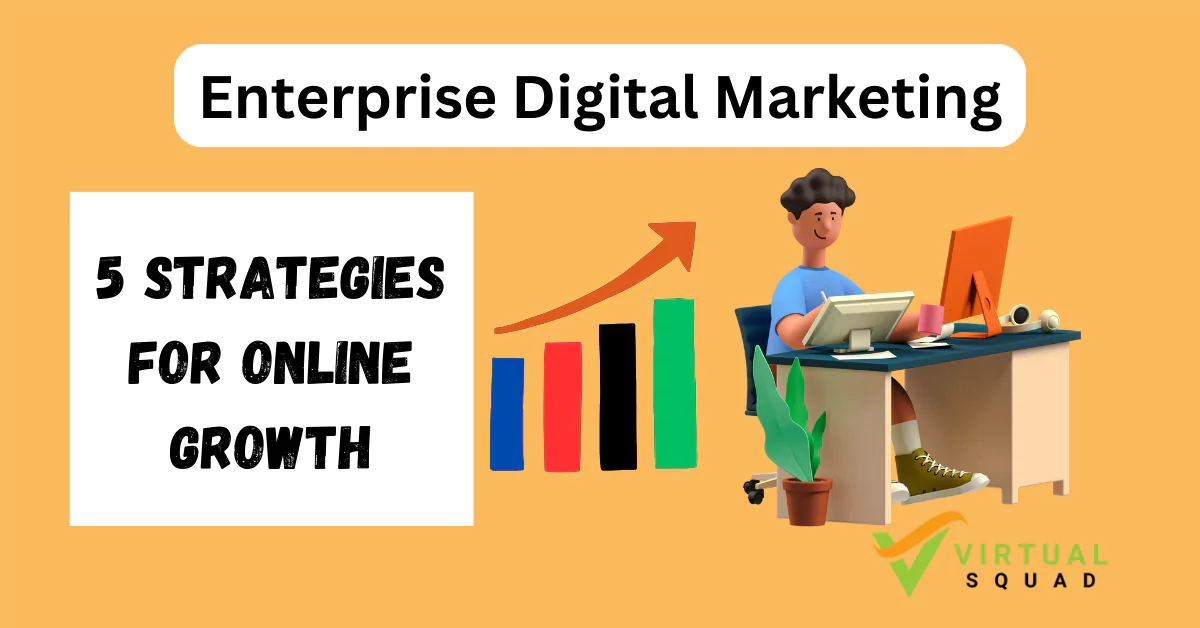In the fast-paced and ever-evolving digital landscape, enterprise digital marketing has become integral to achieving sustainable growth and maintaining a competitive edge. Large-scale businesses face unique challenges that demand comprehensive and strategic approaches to maximize online presence and engagement. In this blog, we will delve into five powerful strategies tailored for enterprise digital marketing, aimed at propelling businesses toward unparalleled online growth.
1. Data-Driven Decision Making
Data stands as the cornerstone of success in enterprise digital marketing. Large enterprises must leverage robust analytics tools to gather, interpret, and act upon data insights effectively. The implementation of a sophisticated customer relationship management (CRM) system is crucial for tracking customer interactions, managing leads, and optimizing communication channels.
Investing in platforms like Google Analytics, Adobe Analytics, or custom analytics solutions enables enterprises to gain a deep understanding of website performance, user behavior, and conversion metrics. This data-driven approach empowers businesses to make informed decisions, allocate resources efficiently, and enhance the overall customer experience.
The adoption of data-driven decision-making positions enterprises to respond promptly to market trends, customer preferences, and emerging opportunities, providing a competitive advantage in the digital landscape.
2. Personalized Content Marketing
In the vast digital expanse, generic content often falls short of making a meaningful impact. Personalized content marketing is a strategic shift that involves tailoring content to meet the specific needs and preferences of the target audience. This goes beyond merely addressing customers by their names; it involves crafting content that resonates with demographics, behaviors, and individual preferences.
Marketing automation tools play a pivotal role in executing personalized content strategies. Enterprises can create dynamic content journeys through email campaigns, website interactions, and social media engagement. By delivering content that is relevant at each stage of the customer journey, enterprises can build stronger connections, foster brand loyalty, and achieve higher conversion rates.
The era of personalized content marketing reflects an understanding that customers seek tailored experiences, and enterprises that deliver such experiences gain a competitive edge in the digital marketplace.
3. SEO at Scale
Search Engine Optimization (SEO) remains a linchpin in the success of enterprise digital marketing. However, the scale of enterprise websites often introduces unique SEO challenges. A robust SEO strategy for large enterprises involves a holistic approach encompassing technical SEO, on-page optimization, and content marketing.
Effective SEO strategies include comprehensive keyword research, optimization of website structures, and ensuring mobile responsiveness. Given the extensive content libraries of large enterprises, organizing content with a focus on SEO is essential for improved visibility in search engine results.
Staying abreast of search engine algorithms, industry trends, and regularly conducting SEO audits contribute to sustained online growth. Enterprises must approach SEO as an ongoing process that adapts to changes in user behavior and search engine algorithms.
4. Omni-Channel Marketing
Large enterprises often operate across multiple channels, both online and offline. Omni-channel marketing is the strategy of providing a seamless and consistent experience across all customer touchpoints, whether it’s a website, social media platform, mobile app, or in-person interaction.
The integration of various channels requires a cohesive approach, ensuring that customers experience consistent messaging, branding, and service quality across every interaction. This integration involves the synchronization of customer data, enabling enterprises to provide a unified experience irrespective of the channel through which customers engage.
Omni-channel marketing enhances customer engagement, reduces friction in the buying process, and allows enterprises to deliver a more holistic and satisfying customer experience. It reflects an understanding that modern consumers expect a unified and integrated brand experience.
5. Influencer Marketing on a Massive Scale
While influencer marketing is a prevalent strategy, large enterprises have the unique opportunity to leverage influencers on a massive scale. Beyond individual influencers, enterprises can collaborate with industry leaders, thought influencers, and experts to amplify their reach and credibility.
This approach involves strategic partnerships that extend beyond sporadic campaigns. Enterprises can host webinars, co-author content, and feature influencers prominently in ongoing marketing efforts. By tapping into the established audiences and credibility of industry influencers, enterprises can extend their reach and enhance their authority in the market.
Building and maintaining long-term relationships with a network of influencers provides a continuous stream of authentic content. This fosters brand advocacy and positions the enterprise as a thought leader in the industry, contributing to sustained online growth.
Conclusion
In conclusion, enterprise digital marketing demands a strategic, adaptive, and innovative approach to navigate the complexities of large organizations. By embracing data-driven decision-making, personalizing content, prioritizing SEO at scale, implementing omni-channel marketing, and leveraging influencer marketing on a massive scale, enterprises can achieve sustained online growth.
As the digital landscape continues to evolve, agility and innovation in digital marketing strategies will be crucial for enterprises to maintain a competitive edge and thrive in the digital era. Embracing these strategies positions enterprises to not only navigate the challenges of the digital landscape but also to capitalize on the myriad opportunities for expansion, engagement, and success.






